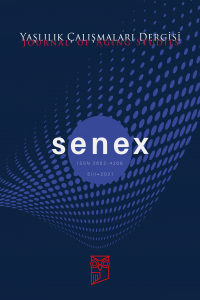Barış’a Mektup Ötekinin Sorumluluğu Büyükannede!
Abstract
Yazı Koreli yönetmen Lee-Jeong-hyang’ın, Eve Doğru (2002) filmdeki Seul’den büyükannesine bir süre için gelen Sang-woo’nun, içsel yolculuğunu irdeliyor. Büyükanne belki de yaşamında ilk kez ayrımcılıkla karşılaşıyor. Bu yaşadığı doğada deneyimlemediği bir olgudur. O ayrımcılığı deneyimlerken torunu Sang-woo dönüşüm geçirir ve koşulsuz sevginin sunacağı haz duygusuyla tanışır. Bu sürecin iki önemli imgesi var: Büyükannenin anlam fazlalığı taşıyan yüzü ve durmadan onardığı ayakkabıları. Yüz çözümlemeleri için Deleuze ve Guattari yol açıyor. Levinas’ın ötekinin sorumluluğunu alma, etik özne olma, kendini savunma yetkisini ortadan kaldırma gibi yaklaşımları yazının çerçevesini oluşturuyor. Yazı yoksul ama yerinde yaşlandığı için mutlu olan, bilge bir kadının portresini sunuyor bize.
References
- Acar, S. (2016). Levinas’ta Aşkınlık Düşüncesine Giriş. Kaygı, 27 (27): 93-110.
- Adams, C. (2010). Etin Cinsel Politikası: Feminist-Vejetaryan Eleştirel Kuram. (Çev. G. Tezcan & M. E. Boyacıoğlu). İstanbul: Ayrıntı.
- Augé, M. (1997). Yer-olmayanlar. (Çev. T. Ilgaz). İstanbul: Kesit.
- Bernasconi, R. (2011). Levinas Okumaları. ( Çev. Z. Direk). İstanbul: Pinhan.
- Bonitzer, P .(2006). Kör Alan ve Dekadrajlar. (Çev. İ. Yasar). İstanbul: Metis.
- Breton, le D. (2018). Yüz Üzerine: Antropolojik Bir Deneme. (Çev. O. Türkay). İstanbul: Boğaziçi.
- Campell, J. (2000). Kahramanın Sonsuz Yolculuğu. (Çev. S. Gürses). İstanbul. Kabalcı.
- Cicero, P. (2016.). Dostluk ve Yaşlılık. (Çev. A. Özüpek). Ankara: Yason.
- Çırakman, E. (2011). Levinas’ta Öteki ve Adalet: Eleştirel Bir Not. Doğu Batı, 4 (13): 179-199.
- Deleuze, G. ve Guattari, F. (2014). A Thousand Plateaus. London: Bloomsbury.
- Finkielkraut, A. (1995). Sevginin Bilgeliği. (Çev. A. Ekmekçi). İstanbul: Ayrıntı.
- Freud, S. (2016). Sanat ve Edebiyat. (Çev. E. Kapkın & A. Tekşen). İstanbul: Payel.
- Grefe, C. (1994). Hamburger Çağı. (Çev. O. Duman.) İstanbul: İletişim.
- Gürbilek, N. (2020) İkinci Hayat: Kaçmak, Kovulmak, Dönmek Üzerine Denemeler. İstanbul: Metis.
- Gürkaş, E. & Barkul, Ö. (2012.)Yer Üzerine Kavramsal Bir Okuma Denemesi. Sigma, 4:1-11.
- Heidegger, M. (2008). Düşüncenin Çağırdığı.(Çev. A. Aydoğan). İstanbul: Say.
- Kalınkara, V. (2019). Yerinde Yaşlanma ve Geronteknoloji. V. Kalınkara (Ed.), Yaşlılık: Yeni Yüzyılın Gerçeği (s. 467-501). Ankara: Nobel.
- Levinas, E. (1997). Otherwise Than Being or Beyond Essence. (Çev. A. Lingis). London: Springer.
- Levinas, E. (2010) Olmaktan Başka ya da Özün Ötesinde. (Çev. H. Mavituna). MonoKL:Lévinas Özel Sayısı, 8-9: 628-654.
- Levinas, Emmanuel. (2016). Sonsuza Tanıklık. Z. Direk ve E. Gökyaran (Ed. İstanbul: Metis.
- Montepare, J. M. & Zebrowitz, L. A. (2002). A Social-Developmental View of Ageism. T. D. Nelson (Ed.), Ageism. Stereotyping and Prejudice Against Older Persons (s. 77-125). Massachussetts: The MIT Press.
- Phillips, A. (2017).Yasak Olmayan Hazlar. (Çev. S. Nilüfer). İstanbul: Metis.
- Schmid, W. (2018). Anne Baba ve Büyükanne Büyükbaba Olmanın Sevinçleri Üzerine. (Çev. T. Bora). İstanbul: İletişim.
Abstract
This article examines the inner journey of the character Sang-woo in Korean director Lee Jeong-hyang’s film The Way Home (2002). In the film, the young boy Sang-woo travels from Seoul to live with his grandmother. At his hands, the grandmother experiences discrimination for perhaps the first time in her life, as this is not something the natural environment of her simple village life has exposed her to. Yet living with her, the young boy is introduced to the pleasure and transformative power of unconditional love. Two important symbols stand out here: the grandmother’s expressive face and the shoes she is constantly repairing. For the analysis of her face, this article uses Deleuze and Guattari; for its broader theoretical framework, it uses Levinas and his concepts of our responsibility for the Other, being an ethical subject, and forgoing one’s right of self-defense. The article offers up a portrait of a wise woman who is poor but happy because she is able to grow old in her own place.
References
- Acar, S. (2016). Levinas’ta Aşkınlık Düşüncesine Giriş. Kaygı, 27 (27): 93-110.
- Adams, C. (2010). Etin Cinsel Politikası: Feminist-Vejetaryan Eleştirel Kuram. (Çev. G. Tezcan & M. E. Boyacıoğlu). İstanbul: Ayrıntı.
- Augé, M. (1997). Yer-olmayanlar. (Çev. T. Ilgaz). İstanbul: Kesit.
- Bernasconi, R. (2011). Levinas Okumaları. ( Çev. Z. Direk). İstanbul: Pinhan.
- Bonitzer, P .(2006). Kör Alan ve Dekadrajlar. (Çev. İ. Yasar). İstanbul: Metis.
- Breton, le D. (2018). Yüz Üzerine: Antropolojik Bir Deneme. (Çev. O. Türkay). İstanbul: Boğaziçi.
- Campell, J. (2000). Kahramanın Sonsuz Yolculuğu. (Çev. S. Gürses). İstanbul. Kabalcı.
- Cicero, P. (2016.). Dostluk ve Yaşlılık. (Çev. A. Özüpek). Ankara: Yason.
- Çırakman, E. (2011). Levinas’ta Öteki ve Adalet: Eleştirel Bir Not. Doğu Batı, 4 (13): 179-199.
- Deleuze, G. ve Guattari, F. (2014). A Thousand Plateaus. London: Bloomsbury.
- Finkielkraut, A. (1995). Sevginin Bilgeliği. (Çev. A. Ekmekçi). İstanbul: Ayrıntı.
- Freud, S. (2016). Sanat ve Edebiyat. (Çev. E. Kapkın & A. Tekşen). İstanbul: Payel.
- Grefe, C. (1994). Hamburger Çağı. (Çev. O. Duman.) İstanbul: İletişim.
- Gürbilek, N. (2020) İkinci Hayat: Kaçmak, Kovulmak, Dönmek Üzerine Denemeler. İstanbul: Metis.
- Gürkaş, E. & Barkul, Ö. (2012.)Yer Üzerine Kavramsal Bir Okuma Denemesi. Sigma, 4:1-11.
- Heidegger, M. (2008). Düşüncenin Çağırdığı.(Çev. A. Aydoğan). İstanbul: Say.
- Kalınkara, V. (2019). Yerinde Yaşlanma ve Geronteknoloji. V. Kalınkara (Ed.), Yaşlılık: Yeni Yüzyılın Gerçeği (s. 467-501). Ankara: Nobel.
- Levinas, E. (1997). Otherwise Than Being or Beyond Essence. (Çev. A. Lingis). London: Springer.
- Levinas, E. (2010) Olmaktan Başka ya da Özün Ötesinde. (Çev. H. Mavituna). MonoKL:Lévinas Özel Sayısı, 8-9: 628-654.
- Levinas, Emmanuel. (2016). Sonsuza Tanıklık. Z. Direk ve E. Gökyaran (Ed. İstanbul: Metis.
- Montepare, J. M. & Zebrowitz, L. A. (2002). A Social-Developmental View of Ageism. T. D. Nelson (Ed.), Ageism. Stereotyping and Prejudice Against Older Persons (s. 77-125). Massachussetts: The MIT Press.
- Phillips, A. (2017).Yasak Olmayan Hazlar. (Çev. S. Nilüfer). İstanbul: Metis.
- Schmid, W. (2018). Anne Baba ve Büyükanne Büyükbaba Olmanın Sevinçleri Üzerine. (Çev. T. Bora). İstanbul: İletişim.
Details
| Primary Language | Turkish |
|---|---|
| Journal Section | Notes from Fields |
| Authors | |
| Publication Date | September 8, 2021 |
| Published in Issue | Year 2021 Volume: 5 Issue: 1 |

